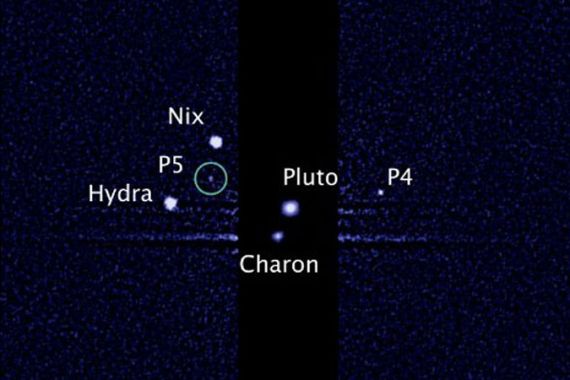Smallest moon yet spotted around Pluto
It appeared as a faint fleck to scientists using the Hubble Space Telescope to scout out the ex-planet’s neighbourhood.

Pluto may have been kicked out of the planet club, but it has gained yet another companion.
Scientists announced on Wednesday the discovery of the smallest moon yet around the icy orb, bringing the count of its known moons to five.
Keep reading
list of 4 itemsCould shipping containers be the answer to Ghana’s housing crisis?
Are Chinese electric vehicles taking over the world?
First pig kidney in a human: Is this the future of transplants?
“We’re not finished searching yet,” said Hal Weaver of Johns Hopkins University, who thinks there may be more.
| Member of Hubble team that found the new moon talks to Al Jazeera about the discovery |
The discovery was made by a team of scientists who used the Hubble Space Telescope to scout out Pluto’s neighbourhood ahead of a NASA spacecraft that’s scheduled to arrive in 2015. When the New Horizons craft was launched in 2006, Pluto was a full-fledged planet, but it has since been demoted to dwarf planet status by the International Astronomical Union.
The newfound moon – known as P5 until it gets a proper name – appeared as a faint fleck in the Hubble images.
Scientists estimated the mini-moon to be 9 to 24 kilometres across, smaller than the still nameless one that they spotted last year, which is 12 to 33 kilometres wide.
Ancient collision
Pluto’s largest moon, the 1,040km wide Charon, was discovered in 1978. Two smaller moons, Nix and Hydra, were found in 2005.
The moons are thought to have formed after an ancient collision between Pluto and an object in the Kuiper Belt, a disk teeming with small bodies that lies beyond the orbit of Neptune.
Since the launch of the New Horizons mission, scientists have been studying the Kuiper Belt in search of debris that might pose a danger to the spacecraft.
Mark Showalter of the SETI Institute said names for the new moon and last year’s discovery will not be proposed until the team finishes analysing the Hubble data in case there are more hidden moons.
Showalter said he favours names that go together – like the mythological Greek couple Orpheus and Eurydice.
“If we happen to find more moons, then we will have to pick a different story from Greek mythology,” he said in an email.